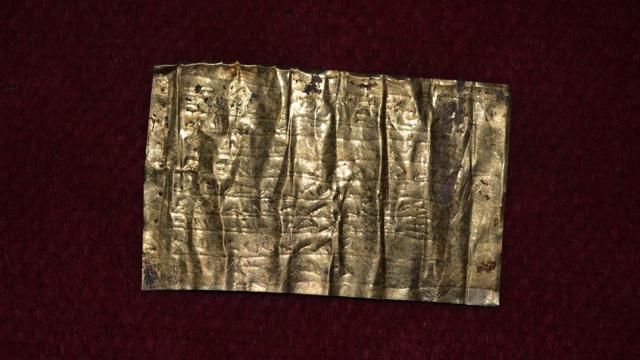Archaeologists working in Serbia have discovered tiny parchments of gold and silver inscribed with what appears to be a series of ancient curses.
Image: Institute of Archaeology, Belgrade
The curse tablets were found alongside human skeletons at an excavation site at the foot of a coal-fired power station in Kostolac in northeastern Serbia. Archaeologists led by Miomir Korać are currently scouring the area in preparation for further construction at the site, which was once home to the ancient Roman city of Viminacium.
A week ago, Korać’s team uncovered two amulets made of lead that were buried alongside the skeletons. Each amulet contained tiny rolls of silver and gold that were covered in symbols and writing. The archaeologists believe Greco-Romans used the artefacts to ask the gods, spirits or the deceased to perform some sort of action on another person or an object, or to invoke some kind of curse. These spells could be benign, such as a love spell, or they could have evil intent, such as wishing a particular misfortune upon an enemy or rival.
One of the newly discovered scrolls contains text written in ancient Aramaic, and not Greek. That presents a mystery to the scientists, but it’s also an important clue. The researchers have identified several demons associated with the territory of what is today Syria, including Baal, Yahweh, Thobarabau, Seneseilam and Sesengenfaranges. Invoking the powers of both Baal and Yahweh on a single tablet is unprecedented.
The History Blog offers more context about these curse tablets:
Found throughout the Greco-Roman world even well into the Christian era, curse tablets called on spirits, demonic or divine powers to control a target — destroy an enemy, force restitution of stolen goods, get someone in the sack or make the opposing team lose. The tablets were thin sheets of lead on which invocations against the targets were scratched. They would then be rolled or folded up and placed in a relevant area usually below the ground, graves, wells, temples, sanctuaries or the homes of the cursed.
The earliest known extant curse tablets were found in the Greek colony of Selinunte in Sicily (modern-day Castelvetrano where they grow the greatest bright green olives) and date to the early 5th century B.C. The 22 Selinute tablets were mostly litigation curses intended to kneecap opponents in a lawsuit. Other popular types of curses include ones against rival sports teams, rival businesses, thieves and love or sex spells. Men tended to deploy curse tablets to arouse women’s passion, while women mostly used curses to stimulate men’s affection.
The other scrolls found at the site don’t contain any recognisable texts, and are instead inscribed with unknown symbols, possibly representing astrological signs or cosmic forces. The archaeologists are currently trying to decipher these symbols, along with the Aramaic texts, in an effort to learn more.
